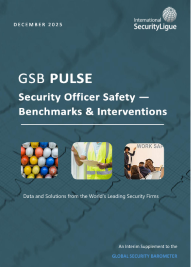
Key Points
- Catastrophic events like terrorism and supply chain disruptions cause massive, lasting stock losses (e.g., $401 M per attack, 33–40% lower returns), and multi-year performance declines.
- Proactive property protection and cybersecurity stabilize cash flow, reduce volatility and equity risk, and correlate with improved share-price performance.
- Media tone and public tolerance amplify financial fallout from breaches, making visible resilience measures and strong governance critical to maintaining shareholder confidence.
By preventing harmful events from taking place, security services clearly help to create—or at least protect—company profits and shareholder value. But how, exactly? By how much? And which risk reduction activities correlate most closely with stock value appreciation or improved financial performance?
Major Security Events Cause Long-Term Harm
From an analysis of available academic research, it is clear—and not surprising—that catastrophic security events have the greatest potential to hurt a company’s financials. Preventing these events—and mitigating their impact by helping to plan for business resilience—is the most direct line of value between spending on security services and stock price.
Corporations impacted by a terrorist attack, for example, suffer significant stock value losses, according to a global sample of 75 firms. Researchers discovered a statistically significant negative stock price reaction after an event, one for which there is no immediate reversal. “We estimate an average decrease in market capitalization of $401 million per attack,” researchers concluded. Stock prices fall even more when terrorist incidents involve kidnapping compared to those limited to direct physical attack (“Terrorism and the Stock Market,” G. Andrew Karolyi and Rodolfo Martell, International Review of Applied Financial Issues and Economics).
Corporate performance is also severely impacted by security-related supply chain disruptions (“The Effect of Supply Chain Disruptions on Long-term Shareholder Value, Profitability, and Share Price Volatility”). In a review of 800 supply chain disruptions afflicting publicly traded companies—resulting from shortages, natural disasters, strikes, and attacks on facilities—researchers isolated the impact of the disruption on stock price and discovered that affected firms’ experience:
• 33 to 40% lower stock returns relative to their benchmarks;
• 13.5% increase in share price volatility;
• 107% drop in operating income;
• 7% lower sales growth, and
• 11% increase in costs.
“By any yardstick, these are very significant economic loses,” concluded the study’s authors, who add that even if they occur infrequently, firms can’t afford supply disruptions given the significant economic toll they exact.
More importantly, firms do not quickly recover from these losses. The evidence indicates that firms continue to operate for at least two years at a lower performance level after experiencing disruptions. — The Effect of Supply Chain Disruptions on Long-term Shareholder Value, Profitability, and Share Price Volatility
The findings highlight why many analysts believe that the ability to minimize business disruptions is at the core of business performance. “Resilience in the face of increasing risk—the ability to avoid, deter, protect, respond, and adapt to market, technology and operational disruptions—is becoming a linchpin of shareholder value,” according to the Council on Competitiveness.
Property Protection Drives Higher Stock Price
It is interesting to note that threats don’t need to materialize for companies to realize value from protecting property. An enlightening study by Oxford Metrica compared companies’ physical loss control programs and stock prices over time and discovered that companies that are more aggressive in protecting property have more stable cash flow. This, in turn, improved investors’ expectations of future cash flow, thereby boosting stock prices. “This research provides empirical evidence that there is a clear correlation between companies’ property risk management and their financial performance,” the study concluded (“Improving Risk Quality to Drive Value”).

With less ability to absorb losses and ride-out a downturn, security is particularly business-critical to small, medium, and micro enterprises (SMME). For example, a study in South Africa of retailers found that stock shrinkage directly relates to the financial performance of retail SMME and that “stock spoilage and internal theft are the strongest predictors of profitability and sales volume loss.” Ultimately, physical stock loss can threaten the very sustainability of operations (“Effects of physical stock loss on the financial performance of retail enterprises," South African Journal of Economic and Management Sciences, June 2024).
Cybersecurity Reduces Equity Risk
Physical security is a prerequisite for preventing information security breaches, and there is a growing body of research on how debilitating these events are to companies’ financial performance.
A recent case in point is an examination of the long-run effect of 276 infosec breaches at publicly traded firms from 2009 to 2018 (“Do information security breach and its factors have a long-run competitive effect on breached firms' equity risk?”, Journal of Competitiveness, March 2022).
An information security breach can materially impact a firm's long-term competitiveness — Study of the long-term impact of infosec breaches
“For publicly listed firms, an infosec breach can have a long-lasting effect on their competitive stock performance, including their equity risk ... breach firms have a 7% higher equity risk than competitive control firms," the researchers concluded.
Perception Influences Impact
Finally, companies also need to consider that damage to stock value or sales from an external incident can change with public attitudes and the amount and tone of news coverage, as reflected in a recent study of firms in Korea that suffered security breaches. “The results of the study indicate the following: (1) news coverage articles about security incidents have a significant effect on stock prices; and (2) the degree of such an effect varies depending on the tone, theme, and category of the news coverage. A more negative tone was associated with a decrease in stock prices.”
Typically, as a type of security risk event becomes more widely known, the public loses tolerance when companies don’t prevent it—and punish a company’s stock price more when it happens. Mass shooting events have grown more common, for example, so a company’s reputation is likely to suffer greater harm should it be victim of an event and the public perceives that it had failed to invest sufficiently in security to prevent it.
However, an event doesn’t need to increase in frequency for the public to become less tolerant of it; in fact, when events become extremely rare, the public may lose tolerance because it deems it preventable (rail crashes, for example). These findings suggest that company executives and corporate boards, if they truly wish to align security with business goals, will consider public attitudes as they prioritize spending, and spend more to prevent highly visible security events that could trigger a shareholder revolt. (“Managing Risk to Increase Stakeholder Value,” International Federation of Accountants).







